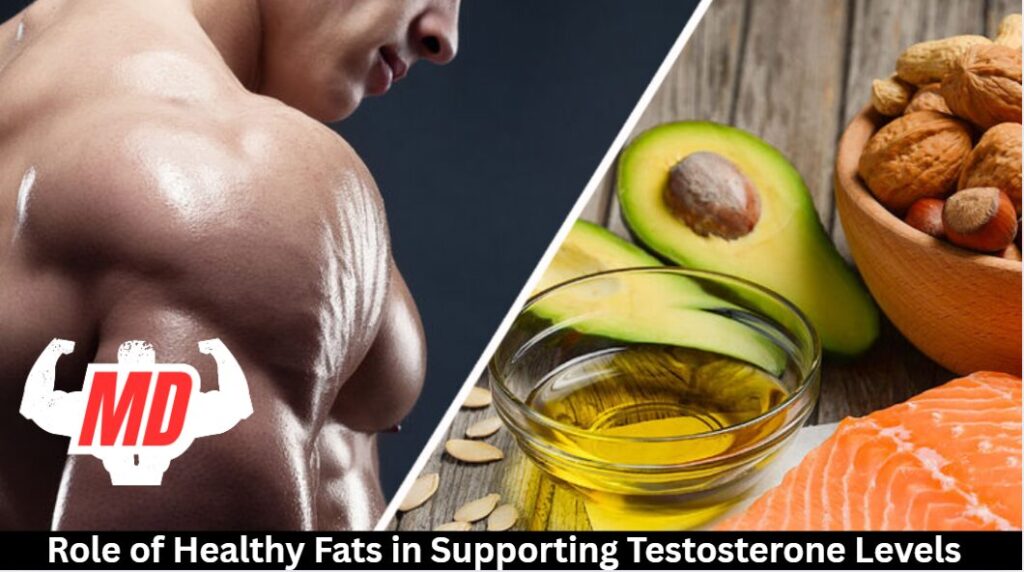Healthy fats are essential for testosterone production as they provide the cholesterol your body needs to synthesize this crucial hormone. Include omega-3 fatty acids from fatty fish, monounsaturated fats from avocados and olive oil, and moderate amounts of saturated fats in your diet. Avoid trans fats and processed oils that can lower T-levels by up to 15%.
Maintaining 25-30% of your calories from quality fats optimizes your hormonal balance. Discover how timing your fat intake enhances these benefits.
The Science Behind Fats and Testosterone Production
While many men focus on protein for muscle development, dietary fats actually serve as the foundation for testosterone production in the body. Your endocrine system relies on healthy fats to create hormones, with cholesterol serving as the primary building block for testosterone synthesis.
When you consume adequate amounts of healthy fats, you’re providing your body with the raw materials needed for hormone production. Omega-3 fatty acids are valuable because they help lower inflammation, which can otherwise negatively affect testosterone levels. Without sufficient dietary fat, your body simply cannot maintain peak hormonal function.

Essential Fatty Acids That Boost Hormone Health
Not all fats have the same effect on testosterone. Certain fatty acids are very important for keeping testosterone production at the right level when it comes to hormone balance. Omega-3 fatty acids are especially good for you because they help lower inflammation that can mess up hormone function.
You should eat a lot of omega-3s and monounsaturated fats. These healthy fats give your body the building blocks it needs to make testosterone quickly and easily. Even small amounts of saturated fats help make hormones.
To get the best results, try to eat a variety of fats every day and stay away from processed and trans fats, which can mess up your endocrine system and lower testosterone levels.

Dangerous Fats to Avoid for Optimal T-Levels
Some fats can help keep testosterone levels healthy, while others can throw off the balance of hormones. Trans fats are bad for you because they can mess with hormone production and lower testosterone levels by as much as 15%.
You’ll want to eliminate or severely restrict foods containing partially hydrogenated oils, fried fast foods, and commercially baked goods. These dangerous fats not only reduce testosterone but also increase inflammation throughout your body, creating a double negative effect on hormonal balance.
Consuming large amounts of processed vegetable oils that are high in omega-6 fatty acids may have negative effects on health. They create an imbalance that interferes with the conversion of cholesterol to testosterone. Check ingredient labels carefully. Manufacturers often hide these hormone-disrupting fats under various names.

Practical Diet Strategies for Hormonal Balance
If you want to raise your testosterone levels through diet, make sure your meals are balanced and include healthy fats and other important nutrients. Try to get 25–30% of your plate from healthy fats like avocados, olive oil, and fatty fish.
Don’t overlook the importance of timing. Consuming monounsaturated fats throughout the day helps maintain steady testosterone production rather than experiencing hormone fluctuations. Try adding nuts to your breakfast, drizzling olive oil on lunch salads, and including salmon at dinner.
The relationship between diet and testosterone works best with consistency. Create a sustainable eating pattern you can maintain long-term, rather than drastic short-term changes that won’t stick. Remember that balanced nutrition supports your endocrine system’s overall health.
Complementary Approaches to Fat Metabolism
A healthy diet is the most important thing for your body’s fat metabolism. Still, exercise is just as important for how your body processes and uses dietary fats to make testosterone.
High-intensity interval training and resistance exercises are especially good for your metabolic health because they help your body turn healthy fats into building blocks for hormones more quickly.
Your endocrine system responds not just to nutrition but also to sleep quality. Getting 7-9 hours of quality sleep maximizes testosterone production overnight when your body naturally rebuilds. Stress management techniques like meditation complement nutritional support by reducing cortisol. It is a hormone that directly competes with testosterone production when elevated.
These lifestyle changes work together with healthy fats in your diet to make it possible for your body to keep its testosterone levels at their highest naturally, without the need for supplements or medical help.
Frequently Asked Questions
How Quickly Can Dietary Fat Changes Affect Testosterone Levels?
You’ll notice small changes in 2-4 weeks, but significant testosterone improvements typically take 8-12 weeks of consistent healthy fat consumption. Your body needs time to adjust its hormonal production pathways.
Can Intermittent Fasting Help Optimize Fat Metabolism for Testosterone?
Yes, intermittent fasting can help optimize your fat metabolism for testosterone production. It may enhance hormone sensitivity, improve fat utilization, and reduce insulin levels, creating favorable conditions for your body’s natural testosterone synthesis.
Do Cooking Methods Affect the Testosterone-Supporting Properties of Fats?
Yes, they do. You’ll retain more testosterone-supporting nutrients when you use gentle cooking methods like steaming or low-heat sautéing instead of high-heat frying, which can damage beneficial fats.
How Do Alcohol Consumption Patterns Impact Fat-Related Hormone Production?
Regular alcohol consumption disrupts your liver’s fat metabolism, hindering testosterone production. Even moderate drinking can lower hormone levels by 6-7%, while excessive use severely impacts your body’s ability to utilize healthy fats effectively.
Are Testosterone Benefits From Healthy Fats Different for Younger Versus Older Men?
Yes, they differ. As you age, healthy fats become more essential for testosterone support since your natural production declines. Younger men benefit too, but older men see more significant hormonal improvements from dietary fats.



